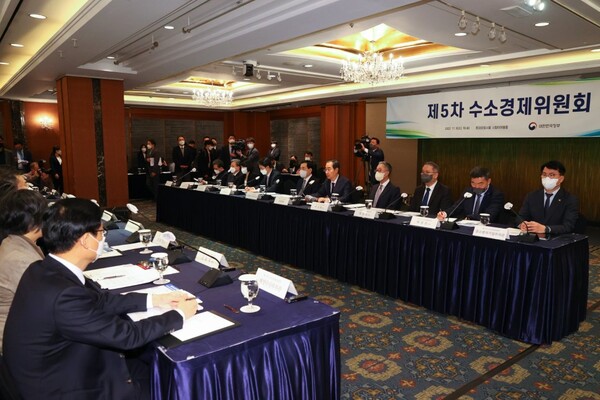
Dedicated committee holds first meeting after inauguration of the Yoon administration
South Korea promised on Nov. 9 that the country would boost the hydrogen economy by breathing funds and energy into developing related technologies.Asia’s fourth-largest economy came up with the plan during the Hydrogen Economy Committee, which took place for the first time after President Yoon Suk-yeol took office this May.During the gathering, presided over by Prime Minister Han Duck-soo, the committee came up with three strategies of scale-up, build-up, and level-up.“Thus far, our hydrogen policies have been mostly about small areas like hydrogen automobiles and stem cells for power generation,” a committee official said.“As a result, we are lagging behind advanced countries in such sectors as producing, storing, and delivering hydrogen. We want to change this down the road.”The committee noted that Korea should reduce its reliance on grey hydrogen and instead depend more on blue hydrogen.Hydrogen is classified as gray, blue, and green in terms of the way it is produced. Although hydrogen emits just water when burned, the process of creating it may emit carbons.Grey hydrogen, which is made from natural gas, or methane, is the most common form of hydrogen production today. It does not capture greenhouse gases.In comparison, green hydrogen is the only type made in a climate-neutral manner, and an increasing number of countries have set up strategies to replace grey hydrogen with green one.To boost the country’s hydrogen economy, the committee also agreed to cooperate with private corporations, including Samsung, SK, POSCO, Lotte, and Hyosung.“By 2030, the number of hydrogen-powered commercial vehicles would reach 30,000 with the hydrogen station reaching up to 70 places across the nation,” the committee official said.“By the year, we strive to nurture a total of 600 hydrogen-related corporations and secure associated technologies comparable to those of advanced economies.”In the meantime, Prime Minister Han appointed 11 members from the private sector on top of nine from the government for the Hydrogen Economy Committee.Included in them are Doosan Enerbility CEO Park Gee-won, KEPCO CEO Cheong Seung-il, SK E&S CEO Choo Hyeong-wook, and H2Korea Chairman Moon Jae-do.이 기사를 공유합니다
Hillary Lee
(homin30@hanmail.net)

